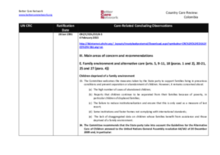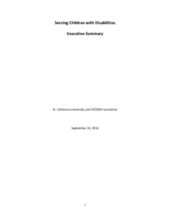Displaying 271 - 280 of 464
This country care review includes the care-related Concluding Observations adopted by the Committee on the Rights of Persons with Disabilities during the sixteenth session (15 Aug 2016 – 2 Sep 2016) of the Convention on the Rights of Persons with Disabilities.
In this video from United Aid for Azerbaijan, several experts and public officials discuss the importance of deinstitutionalization.
This country care review includes the care-related Concluding Observations adopted by the Committee on the Rights of Persons with Disabilities during the sixteenth session (15 Aug 2016 – 2 Sept 2016) of the Convention on the Rights of Persons with Disabilities.
This article is a discussion of the state of foster care for children with disabilities. This study explores three areas related to foster care outcomes: 1) previous disrupted or dissolved adoptions among youth with and without intellectual disabilities; 2) demographic or disability related disparities of youth with intellectual disabilities who were and were not discharged from care; and 3) foster care outcomes of youth with and without intellectual disabilities.
This country care review includes the care-related Concluding Observations adopted by the Committee on the Rights of Persons with Disabilities during the sixteenth session (15 Aug 2016 – 2 Sep 2016) of the Convention on the Rights of Persons with Disabilities.
This summary examines the conditions children with disabilities face in Zambia. The summary asks if the quality of life for these children can be improved?
This document provides a formative assessment on the state of children with disabilities in Zambia.
By drawing on an empirical study on placing disabled children for adoption, the article seeks to demonstrate the practical application of critical realist by combining its Retroductive framework with Grounded Theory methods.
Este informe, presenta los resultados de ese estudio, examina las condiciones en que se encuentran los niños y los adolescentes con discapacidad en relación con el ejercicio de sus derechos, y propone algunas líneas de acción estratégica para mejorar las políticas y las prácticas en dirección a la garantía y la restitución del derecho de todos los niños, las niñas y los adolescentes a crecer en un ámbito familiar y comunitario, y sin discriminación.
To examine the science, economics, and politics of investing in the health, education, nutrition, and social protection of children at the margins, the Forum on Investing in Young Children Globally (iYCG Forum) held a workshop in Prague, Czech Republic, on November 3–4, 2015, titled, “Reaching and Investing in Children at the Margins.” This report summarizes the workshop and highlights the key learning from the event.







